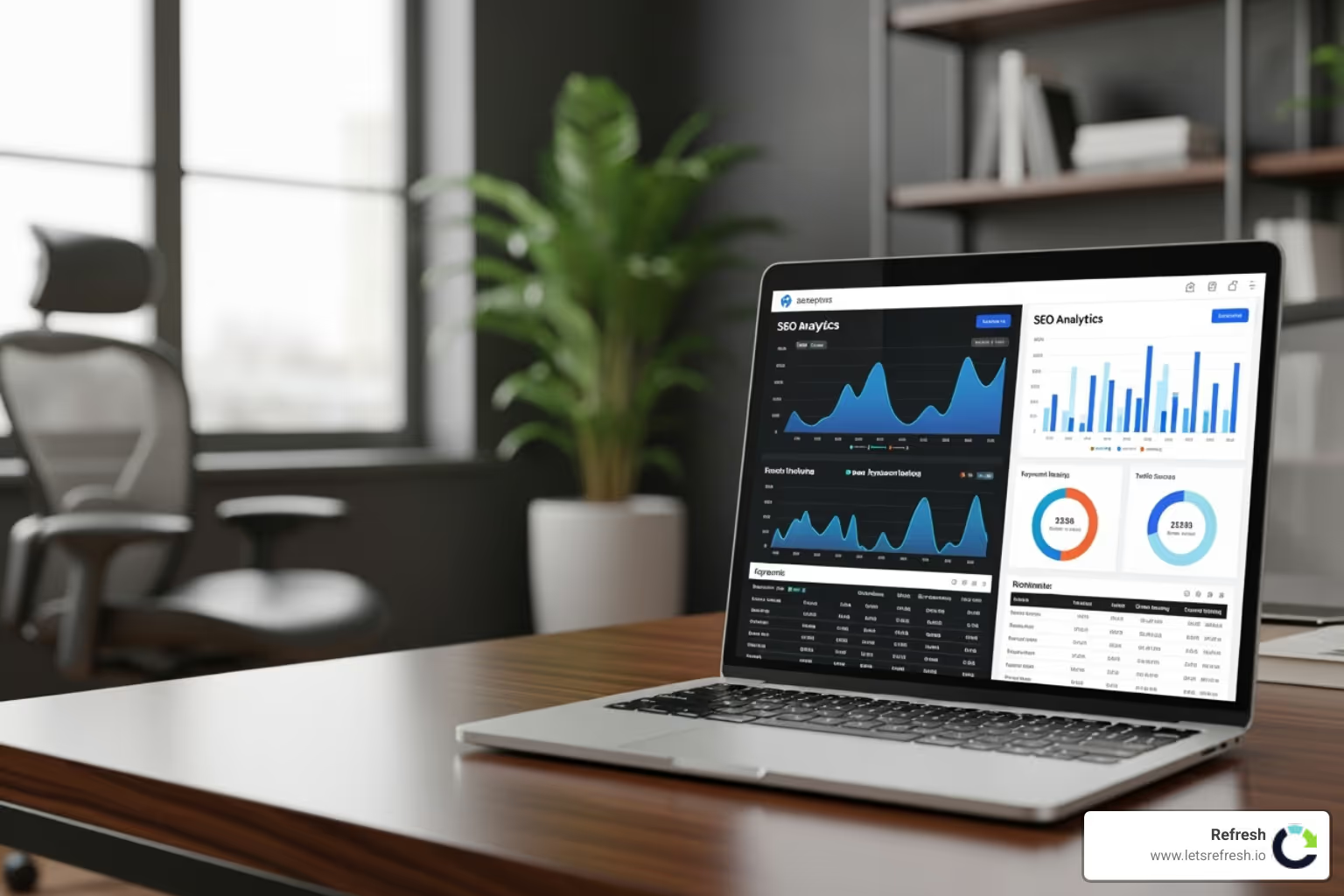Why AI is a Game-Changer for Small Business SEO
As AI transforms digital marketing, more entrepreneurs are asking: what are the best ai seo tools for small businesses? Here are the top categories that deliver real results:
Content Creation & Optimization:
- Jasper - AI content generation with SEO optimization
- Surfer SEO - Content analysis and SERP-based recommendations
- Clearscope - Keyword optimization and content scoring
Keyword Research & Strategy:
- Semrush - Comprehensive AI-powered keyword analysis
- ChatGPT - Long-tail keyword findy and content ideas
- Ahrefs - Competitor keyword gap analysis
Technical & Local SEO:
- Alli AI - Automated on-page optimization
- SE Ranking - AI Overview tracking and local search tools
- Screaming Frog - Technical site audits with AI insights
The reality is striking: 9 out of 10 organizations believe AI tools provide a competitive advantage. For small businesses, AI levels the playing field against larger competitors with bigger marketing budgets.
These tools don't just save time; they uncover opportunities human analysis might miss. By identifying low-competition keywords and automating technical fixes, AI handles the heavy lifting so you can focus on your business.
The shift is happening now. SEO tasks that took hours now take minutes. Content can be optimized instantly, and with 30% of people globally using voice search, AI tools help you adapt to new search behaviors.
As the founder of Refresh Digital Strategy, I've seen the right AI tools transform SEO outcomes across our 200+ website launches. Understanding what are the best ai seo tools for small businesses is essential for any entrepreneur looking to compete online.
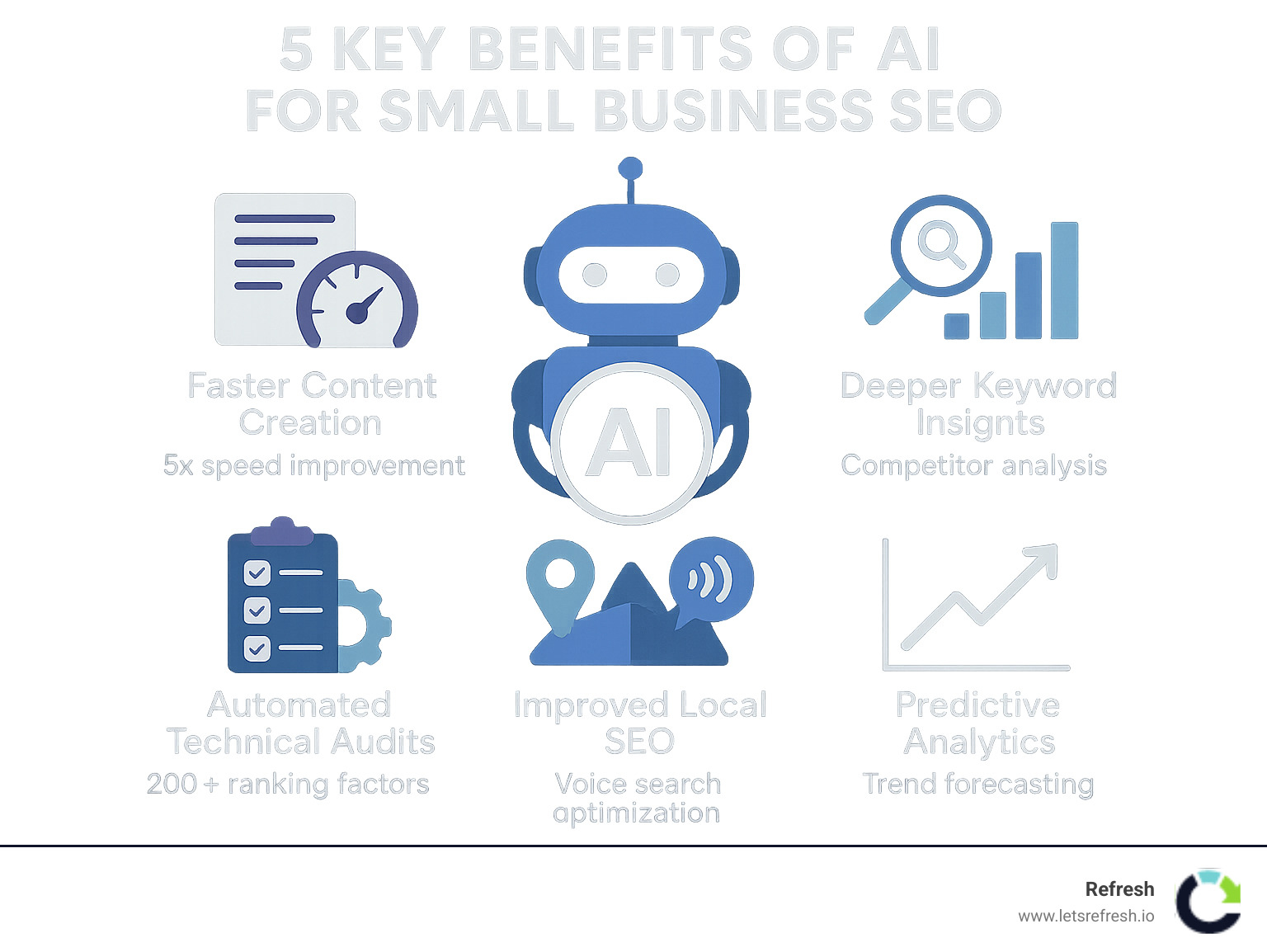
How AI SEO Tools Empower Your Business Strategy
Juggling a dozen tasks and wondering why your website isn't showing up on Google? The old way meant hours of manual data digging. Asking what are the best ai seo tools for small businesses changes this entire game.
AI SEO tools act as a brilliant assistant, using artificial intelligence algorithms, machine learning, and natural language processing to analyze massive amounts of data in minutes. They spot patterns humans might miss and understand language nuances to help your content connect with searchers.
These tools automate repetitive tasks like rank tracking and competitor research, freeing you to focus on running your business and serving customers.
Beyond saving time, AI is constantly uncovering opportunities. It can identify valuable long-tail keywords your competitors have missed or spot trending topics before they peak, acting like a crystal ball for your content strategy.
Google updates its algorithm over 1,000 times per year, a major headache for business owners. AI tools are built to adapt to search engine updates automatically. They monitor shifts, learn from new data, and adjust recommendations, keeping your strategy current without you needing to be an algorithm expert.
At Refresh, we've seen clients use these tools to not just keep up with larger competitors, but outmaneuver them. Explore how this could work for you with our more info about our SEO for small business services.
Here's how AI transforms the SEO tasks that used to take forever:
| Manual SEO Task | AI-Automated SEO Task |
|---|---|
| Manual Keyword Research (spreadsheets, basic tools) | AI-powered Keyword Research (identifies trends, intent, clusters, competitor gaps instantly) |
| Content Brief Creation (manual analysis of SERP) | AI-generated Content Briefs (analyzes top-ranking content, suggests topics, length, keywords) |
| Technical Site Audits (manual crawling, error checking) | AI-driven Technical Audits (automates crawling, identifies errors, suggests fixes, even applies some changes) |
| Backlink Opportunity Finding (manual competitor analysis) | AI-assisted Link Building (analyzes competitor backlinks, identifies high-DA sites, automates outreach drafts) |
| Performance Reporting (manual data compilation) | AI-powered Reporting & Overviews (synthesizes data from multiple sources, highlights key insights, predicts trends) |
Understanding Different Types of AI SEO Tools
Different AI SEO tools excel at different jobs. Understanding these categories helps you pick the right solution for your needs.
All-in-one platforms are comprehensive suites that handle everything from keyword research to link building, perfect for businesses wanting one powerful dashboard.
Content creation tools draft blog posts, optimize existing content, and suggest topics. AI writers help generate ideas, while optimization tools analyze your writing against top-ranking pages.
Technical SEO crawlers crawl your site to find broken links, slow pages, and other technical issues hurting your rankings. Some can even fix problems automatically.
Keyword research tools go beyond search volume to analyze user intent, find long-tail keywords, and group related terms to help you build topical authority.
Local SEO managers are essential for physical businesses. They help manage your Google Business Profile, track local rankings, and ensure your business info is consistent online.
Link building assistants tackle one of SEO's biggest challenges by identifying link prospects, helping craft outreach emails, and analyzing competitor backlink strategies.
Choosing the right tool for your goals starts with identifying your biggest SEO challenge. If you struggle with content, start there. If your site is broken, get a technical crawler. You can expand your toolkit as your needs grow.
The Importance of the Human Element
Remember: AI is an assistant, not a replacement for human strategy. Think of it as a smart intern that handles data analysis but needs your guidance.
AI can't capture your unique brand voice or the emotions that drive customers. Your creativity is essential. AI provides the foundation; you add the personality.
Strategic oversight is a human job. AI can identify trending keywords, but you must decide if they align with your business goals and brand values.
Editing and fact-checking AI content is essential. AI can "hallucinate" or produce generic text. Your human eye ensures accuracy and aligns content with Google's E-E-A-T guidelines (Experience, Expertise, Authoritativeness, Trustworthiness).
AI limitations are clear when it comes to relationship building or complex strategy. It can draft an outreach email but can't build the authentic relationships that lead to the best links.
The most successful businesses balance AI's power with the human touch that makes their brand trustworthy. You can learn more about maintaining this balance through Google's E-E-A-T guidelines.
What are the best AI SEO tools for small businesses? A Roundup
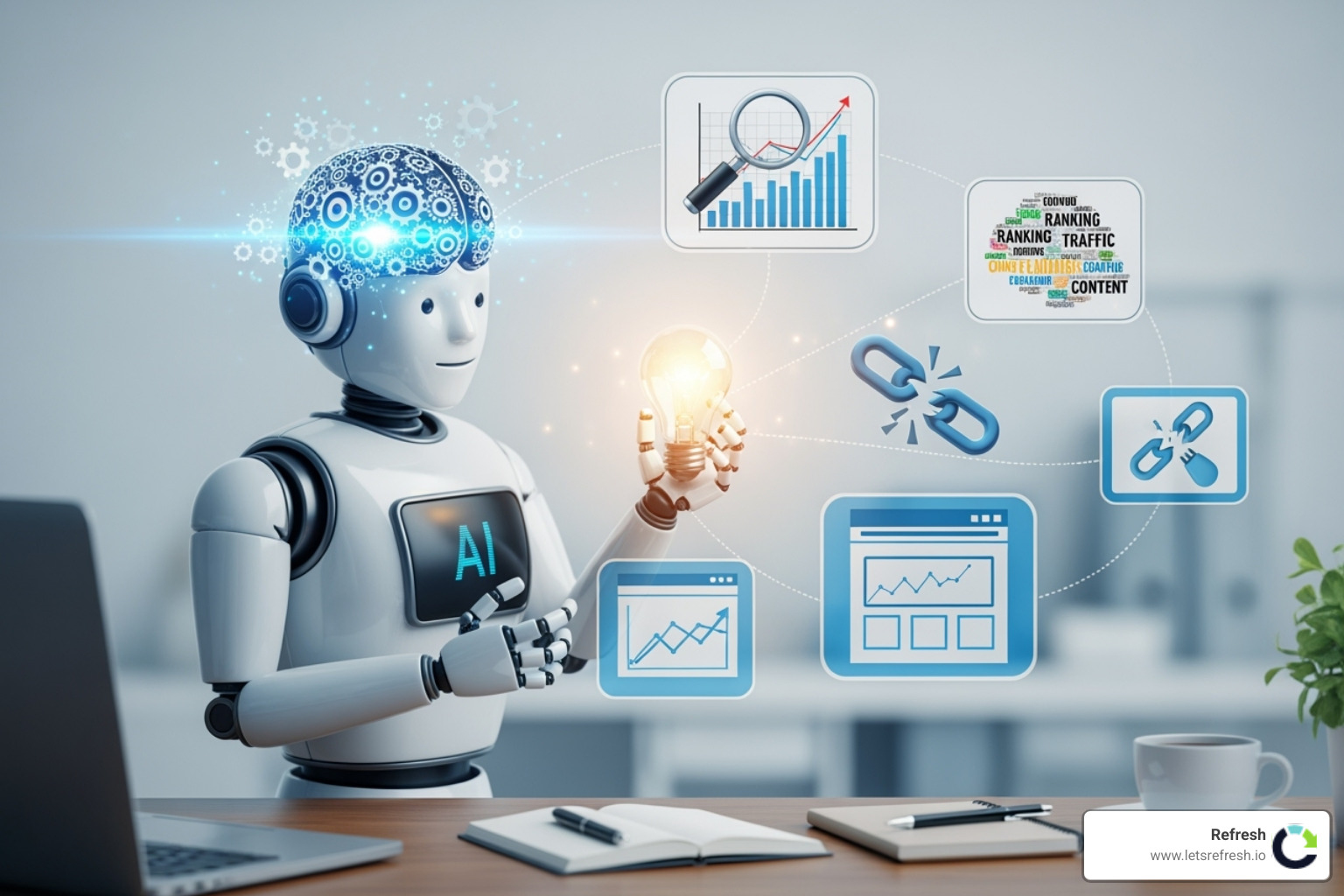
You've probably been wondering, "What are the best AI SEO tools for small businesses?" The good news is there are incredible, user-friendly options that won't break the bank. At Refresh, we've seen the right AI tools transform a company's online presence, helping clients rank on the first page within months. The key is understanding that different tools excel at different tasks. Let's walk through the categories that matter most so you can invest your time and money wisely.
What are the best AI SEO tools for small businesses for content creation?
AI has changed the game for content creation, which was once a major bottleneck for small businesses.
Jasper is a favorite for producing content consistently. This AI writing assistant quickly drafts blog posts, product descriptions, and social media content, excelling at overcoming writer's block.
SurferSEO is a top-tier content optimization tool. It analyzes top-ranking pages for your keyword and gives you a real-time score as you write, showing how well your content matches what's winning in search.
Clearscope focuses heavily on search intent and keyword suggestions, ensuring your content covers all the subtopics searchers care about, making it more comprehensive.
Writesonic connects with major SEO platforms like Ahrefs and Semrush, so its content is based on real search data. It can also learn to mimic your writing style for brand consistency.
Koala AI offers a user-friendly interface with plenty of customization for tone, word count, and structure, making it great for beginners.
MarketMuse takes a strategic approach by identifying content gaps on your website. It analyzes your topical authority and suggests content to fill those gaps, creating a roadmap to becoming an expert.
AISEO emphasizes creating content that reads naturally and passes as human-written, which is increasingly important as search engines improve AI detection.
These tools have revolutionized how small businesses approach content. For more insights, check out More info about digital marketing expert SEO.
What are the best AI SEO tools for small businesses for keyword research?
AI tools have turned keyword research into a precise science, helping you understand not just what people search for, but why.
Semrush remains the gold standard. Its Keyword Magic Tool helps you find what customers are typing into Google, while the Keyword Gap tool reveals competitor weaknesses.
Ahrefs is a strong competitor to Semrush, excelling at competitor analysis. Its Content Gap tool uncovers keywords your competitors rank for that you don't, providing a roadmap of opportunities.
Ubersuggest offers many of the same insights as premium tools but at a fraction of the cost, providing solid data on search volume, keyword difficulty, and content ideas.
Mangools is a beginner-friendly option. Its KWFinder tool focuses on the essentials—search volume, difficulty, and long-tail suggestions—without overwhelming new users.
AnswerThePublic visualizes the questions people ask about your topics, making it fantastic for understanding user intent and creating content that provides direct answers.
ChatGPT, while not a dedicated SEO tool, is incredibly useful for brainstorming long-tail keywords and content angles. Always verify its data with other tools.
RankIQ specializes in finding low-competition, high-value keywords that smaller businesses can realistically rank for, helping you find sweet spots where you can win.
Understanding how AI like Google's RankBrain influences search is crucial for modern keyword research that considers context and intent.
Best AI Tools for Technical and On-Page SEO
Technical SEO is about making sure your website speaks Google's language fluently. These tools make it much easier.
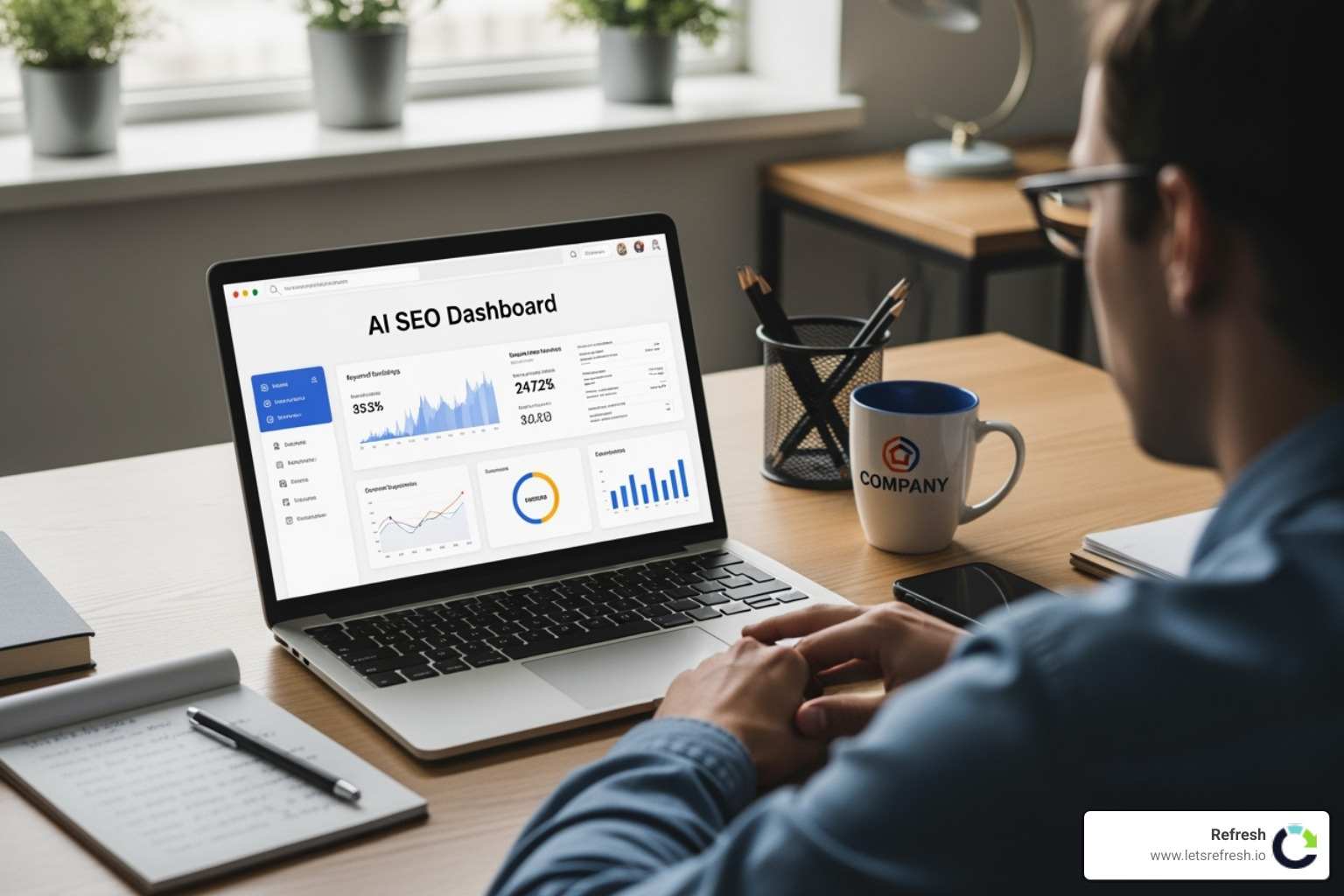
Screaming Frog SEO Spider is an essential desktop tool that crawls your site like Google, identifying broken links, duplicate content, and more. The free version covers up to 500 URLs.
Alli AI takes automation to the next level by not just finding problems but fixing many automatically. It can generate schema markup and address technical issues without you touching code.
NitroPack uses AI to optimize your site's loading speed through code minification, image compression, and smart caching, keeping your site as fast as possible.
SE Ranking offers comprehensive website audits that break down complex technical issues into actionable recommendations, explaining what's wrong, why it matters, and how to fix it.
SEOptimer provides instant snapshots of your website's performance. Plug in your URL for a clear overview of what's working and what needs attention.
Otto SEO focuses on simplifying the entire SEO process, making technical optimization accessible to business owners without engineering backgrounds by emphasizing quick wins.
Best AI Tools for Local SEO and Link Building
For businesses serving specific geographic areas, local SEO is essential. Quality link building also remains a top ranking factor.
Localo focuses on what local businesses need most: optimizing Google Business Profiles, tracking local rankings, and managing reviews to help you show up in "near me" searches.
Yext is valuable for businesses with multiple locations. It ensures your business information is consistent across hundreds of online directories, which is crucial for local and voice search.
ProfilePro by Merchynt zeroes in on Google Business Profile management, the cornerstone of local SEO. A well-optimized profile can make you visible to nearby customers.
Ahrefs and Semrush both offer powerful link building features. Analyze competitor backlink profiles with Ahrefs or streamline outreach with Semrush's Link Building Tool.
JustReachOut takes a PR-focused approach, helping you connect with journalists and bloggers who cover topics relevant to your business. It's great for businesses with stories to tell.
Pitchbox automates the tedious work of link building outreach, managing the entire communication process so you can focus on building genuine relationships.
With about 30% of people globally using voice search, tools like Yext are vital. They help structure your business data so voice assistants can find and share it, optimizing for conversational queries. For more on local strategies, see our More info about local SEO services for small business.
Frequently Asked Questions about AI in SEO
We hear a lot of questions about AI and SEO. Let's address the most common concerns from small business owners about what are the best ai seo tools for small businesses and how to use them.
Is AI-generated content bad for SEO?
The short answer: no. Google doesn't care if a robot or a human wrote your content; they care if it's helpful, accurate, and useful. Google's official stance is that using automation to create helpful, original content is fine. Problems arise when AI is used to create spammy, low-value content just to manipulate rankings.
The key is helpful content that follows Google's E-E-A-T principles (Experience, Expertise, Authoritativeness, Trustworthiness). Think of AI as a writing assistant, not a replacement. Use it for first drafts, but always add your unique insights, fact-check, and edit with your brand voice.
What is the most cost-effective way to start using AI for SEO?
You don't need a huge budget to start. The key is to start small and scale as you see results.
- Google's free tools: Start with Google Analytics, Google Search Console, and Google Keyword Planner. They provide the foundational data for any SEO strategy.
- Freemium models: Use the free versions of tools like ChatGPT for brainstorming or Screaming Frog (up to 500 URLs) for site audits. Many tools offer limited free daily usage.
- Single-purpose tools: Instead of an expensive all-in-one platform, start with a tool that solves your biggest pain point, like a basic Jasper plan for content creation.
- Explore existing tools: Many platforms you already use may be integrating AI features.
The goal is to get value without breaking the bank. Start small, learn what works, and scale your investment as you see results. We also offer More info about affordable small business SEO packages to maximize your ROI.
How do AI tools adapt to Google algorithm changes?
This is a key advantage of modern AI SEO tools. Instead of requiring manual updates, AI tools are built to learn and adapt automatically. They constantly analyze massive amounts of search data, detecting patterns and shifts in what Google rewards.
When Google updates its algorithm, these systems spot the changes and adjust their recommendations accordingly. For example, tools like SE Ranking quickly added AI Overview tracking when Google introduced that feature.
This continuous learning provides predictive insights, helping you prepare for changes before they fully roll out. For small businesses, this automated adaptation is invaluable, keeping your strategy current without you needing to be an algorithm expert.
Conclusion: Integrating AI into Your Winning SEO Strategy

You now have a solid understanding of how AI is changing SEO. The answer to what are the best ai seo tools for small businesses depends on your unique needs, budget, and goals.
Our experience shows that AI tools have the biggest impact when chosen strategically. For content challenges, use Jasper or SurferSEO. For customer insights, use Semrush or Ahrefs. For technical SEO, tools like Screaming Frog or Alli AI can automate the heavy lifting.
The beauty of AI in SEO is that it democratizes digital marketing. Small businesses can now compete without massive teams or budgets, as these tools handle specialist tasks like keyword clustering, technical audits, and content optimization.
However, AI is a powerful assistant, not a magic bullet. The most successful businesses combine AI's power with irreplaceable human elements like brand voice, customer understanding, and strategic vision.
Looking ahead, AI's integration into search is accelerating with features like Google's AI Overviews and growing voice search. Businesses that adapt now by optimizing for conversational queries will thrive tomorrow.
At Refresh, with offices in Pittsburgh, Cleveland, and Charlotte, we combine AI efficiency with human expertise in Webflow development, branding, and SEO. We know that building authentic brand experiences requires a human touch that AI can't replicate.
The future belongs to businesses that accept AI while maintaining their humanity. The right mix of AI tools and human strategy can transform your online presence.
Ready to accelerate your growth? Find out more about our SEO services and let's build a strategy that works for you.


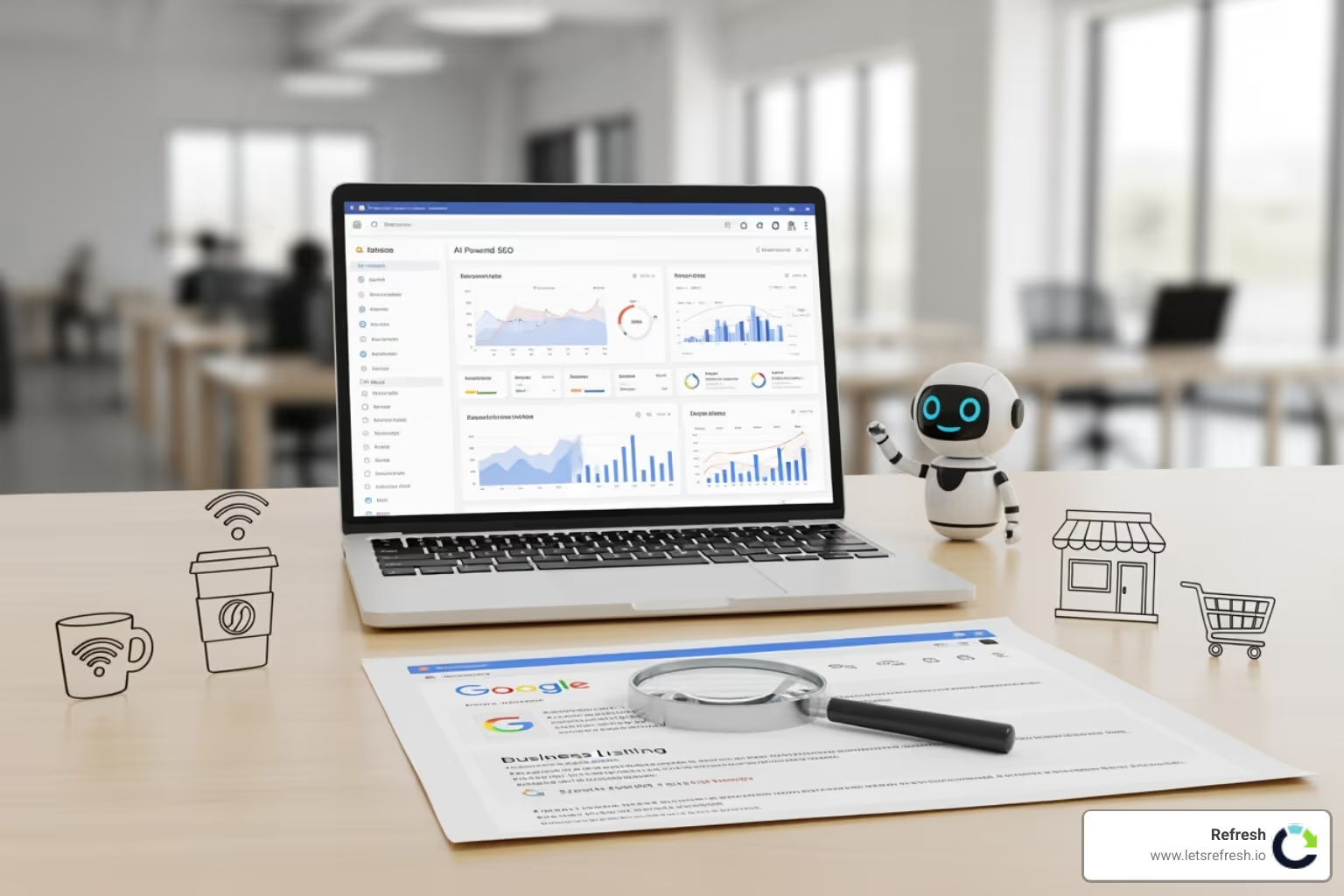

.avif)


